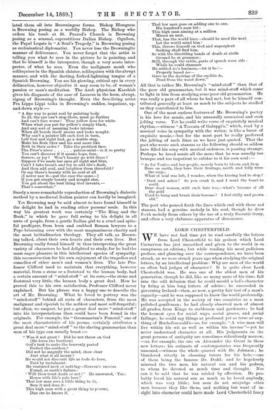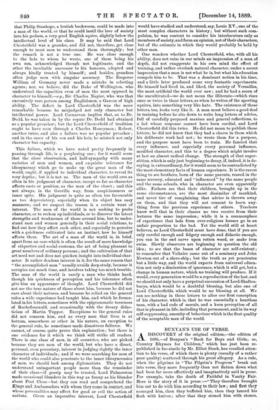LORD CHESTERFIELD.
WE have not had time yet to read carefully the letters. from Lord Chesterfield to his godson which Lord Carnarvon has just unearthed and given to the world in so, sumptuous an edition ; but while reading his most judicious preface, and glancing over the correspondence, we have been struck, as we were struck years ago when studying the original letters, by an intellectual problem : Why are men of the world so often bad judges of character ? It is quite clear Lord, Chesterfield was. He was one of the ablest men of his generation, though he did, like so many more of his time, fall into the odd delusion that he could mould a lad's character by firing at him long letters of advice ; he succeeded in governing Ireland—then, as now, a pretty fair test of a man's capacity—and he was supposed to know the world profoundly. He was accepted in the society of two countries as a most polished gentleman ; he had closely observed men of almost all grades, from Kings to stablemen and gardeners ; he had the keenest eyes for social ways, social graces, and social failings; he could say things as profound yet as terse as any- thing of Rochefoucauld's—as, for example, " A wise man will live within his wit as well as within his income "—yet he never understood character at all. His judgments on the great persons of antiquity are sometimes ridiculously narrow, —as, for example, the one on Alexander the Great in these new letters ; his estimate of contemporaries was frequently unsound,—witness the whole quarrel with Dr. Johnson ; he blundered utterly in choosing tutors for his heir,—one of them being the famous Dr. Dodd; and he hopelessly misread the two men, his natural son and his godson, to whom he devoted so much time and thought. Nor can it be said that he was misled by affection. He pro- bably loved his natural son as much as he loved anybody, which was very little ; but men do not misjudge other men because they like them, and nothing but want of in- sight into character could have made Lord Chesterfield fancy
that Philip Stanhope, a loutish bookworm, could be made into a man of the world, or that he could instil the love of society into his godson, a very good English squire, slightly below the intellectual level of his class. It may be said that Lord Chesterfield was a grandee, and did not, therefore, get close enough to most men to understand them thoroughly; but the remark is not a true one. He was close enough to the lads to whom he wrote, one of them being his own son, acknowledged though not legitimate, and the other the inevitable successor to his honours, adopted and always kindly treated by himself ; and besides, grandees often judge men with singular accuracy. The Emperor William of Germany never made a mistake in selecting agents ; nor, we believe, did the Duke of Wellington, who understood the capacities even of men the most opposed in character to himself,—e.g., Sir Charles Napier, who was that excessively rare person among Englishmen, a Gascon of high ability. The defect in Lord Chesterfield was the more remarkable because he misjudged not only character but intellectual power. Lord Carnarvon implies that, as to Dr. Dodd, he was taken in by the repute Dr. Dodd had obtained as a popular preacher; but the Lord Chesterfield of tradition ought to have seen through a Charles Honeyman ; Robert, another tutor, and also a failure, was no popular preacher ; and in the cases of his son and his heir, he mistook not only character but capacity.
This failure, which we have noted pretty frequently in passing through life, is a perplexing one ; for it would seem that the close observation, and half-sympathy with many varieties of men and women, and exquisite tolerance for idiosyncrasy which go to make up the great man of the world, ought, if applied to individual character, to reveal its very depths ; but it is not so. The man of the world errs as often in his judgment of character, except so far as character affects caste or position, as the man of the closet ; and this not always, in the Greville way, from suspiciousness or inner spite. His judgment is quite as often too favourable as too depreciatory, especially when its object has easy manners; and we suspect the reason is a certain want of interest. The man of the world is not seeking to probe character, or to reckon up individuals, or to discover the latent strengths and weaknesses of those around him, but to under- stand men and women generally in their social relations, to find out how they affect each other, and especially to perceive with a quickness cultivated into an instinct, how he himself affects them. The art of a man of the world is, in brief, apart from an ease which is often the result of mere knowledge of etiquettes and social customs, the art of being pleasant to great numbers of ordinary persons ; and the cultivation of that art need not and does not quicken insight into individual char- acter. It rather deadens interest in it, for the same reason that " the accomplished man " usually avoids deep study, because it occupies too much time, and involves taking too much trouble. The man of the world is rarely a man who thinks hard, though his quickness of perception and his tolerance often give him an appearance of thought. Lord Chesterfield did not see the true nature of those about him, because he did not care about their natures, and because he relied on the general rules a wide experience had taught him, and which he formu- lated in his letters, sometimes with the epigrammatic terseness of Rochefoucauld, and occasionally with the dreary didac- ticism of Martin Tupper. Exceptions to the general rules did not concern him, and as every man that lives is at bottom, somewhere or other in his nature, an exception to the general rule, he sometimes made disastrous failures. We cannot, of course, quite prove this explanation ; but there is one evidence for it which we think will strike all readers. There is one class of men, in all countries, who are picked because they are men of the world, but who have a direct, personal, even pecuniary, interest in judging rightly the inner character of individuals ; and if we were searching for men of the world who could also penetrate to the inner idiosyncrasies of men, we should look among diplomatists. They do not understand unimportant people more than the remainder of their class—if gossip may be trusted, Lord Palmerston made occasional blunders in this way as funny as his blunder about Poet Close—but they can read and comprehend the Kings and Ambassadors with whom they come in contact, and whose personalities may affect for good or evil the action of nations. Given an imperative interest, Lord Chesterfield would have studied and understood, say, Louis XV., one of the most complex characters in history ; but without such com- pulsion, he was content to consider his interlocutors only as Members of society, and form an opinion, not of their characters, but of the estimate in which they would probably be held by other men.
One wonders whether Lord Chesterfield, who, with all his ability, does not raise in our minds an impression of a man of depth, did not exaggerate in his own mind the effect of training, and rather overlook natural character, under a secret impression that a man is not what he is, but what his education compels him to be. That was a dominant notion in his time, and a little later produced some very fantastic experiments. He himself had lived in, and liked, the society of Versailles, the most artificial the world ever saw ; and he had a scorn of the uncultivated—we do not mean the illiterate—which rises once or twice in these letters, as when he writes of the sporting squires, into something very like hate. The existence of these letters, too, looks very like it. A man must believe a good deal in training before he sits down to write long letters of advice, full of carefully prepared maxims and general reflections, to a lad whose response cannot have been cordial, and Lord Chesterfield did this twice. He did not mean to publish these letters; he did not know that they had a charm in them which his deliberate work had not ; he wrote them for a purpose, and the purpose must have been to train. He fancied that every influence, and especially every personal influence, modified character, and this to a degree which might involve at last an almost radical change. The strength of that super- stition, which is only just beginning to decay, if, indeed, it is de- caying, is extraordinary, for it would seem to be contradicted by the most elementary facts of human experience. It is the rarest thing to see brothers, born of the same parents, reared in the same nursery, educated and "influenced" by the same people and the same schools, who in character are even apparently alike. Fathers see that their children, brought up in the same circumstances, are the most dissimilar of mankind, and never tire of complaining that advice is thrown away on them, and that they will not consent to learn any- thing from the previous experience of others. Teachers know well that in their classes no two receive from their lectures the same impression ; while it is a commonplace of experience that lads from over-religious houses go in an unfair proportion to the bad. Yet the world still at heart believes, as Lord Chesterfield must have done, that if you are only careful enough and fidgety enough and didactic enough, you can in the end carve upon rotten wood, or make iron swim. Slowly observers are beginning to question the old idea; to see that the bases of character are self-existent ; to remember that Voltaire came out of a seminary and John Newton out of a slave-ship ; but the truth as yet penetrates but a little way, and the world expects from universal educa- tion not only a diminution of ignorance, which it will get, but a change in human nature, which no training will produce. If it would, every generation would be a reproduction of the last, and we should not only have a perpetual succession of Lord Shaftes- burys, which would be a doubtful blessing, but also one of Lord Chesterfields, which would be no blessing at all. We can see nothing in these letters to alter our first conception of his character, which is, that he was essentially a heartless man, with a bad code of morals, and a keen perception of all that is pleasant in life, including that permanent, and in its way self-suppressing, amenity of behaviour which is the first quality of the acceptable man of the world.











































 Previous page
Previous page